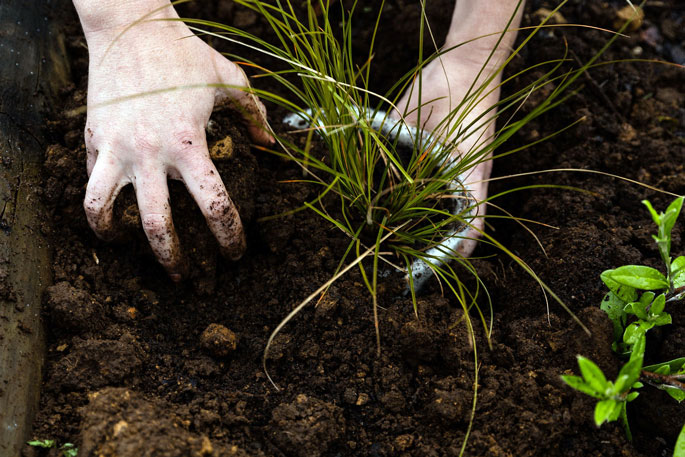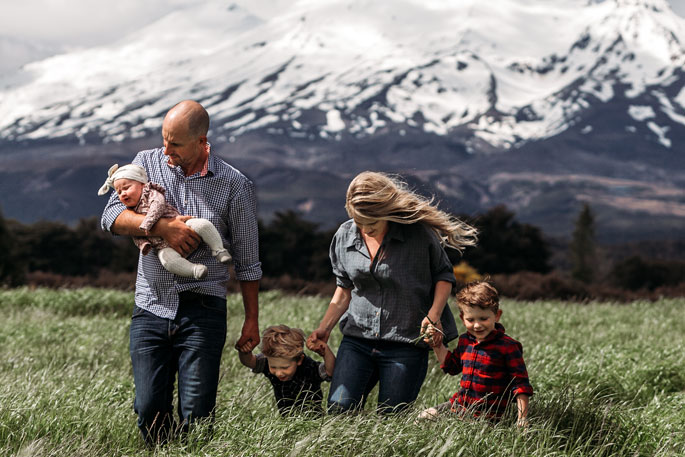It took a lightbulb moment for Sustaina Grow’s Rita Hammond to expand her own sustainable gardening practices into an environmentally sustainable business.
Schoolteacher Rita went on maternity leave four years ago and is now a mum of three. Her family live on a 64-hectare farm in the foothills of Mount Ruapehu, near Ohakune. Husband Dave is a fencing contractor and runs the sheep and beef farm.
“We run 80 heifers and 80 bulls, with 50 ewes and lambs,” says Rita.
Rita spends a lot of her time in the garden with the children and has been utilising the sheep dags from the farm in her vegetable garden.
“They are perfect to use as mulch, as the wool naturally biodegrades putting all its goodness back into the soil.”
Sheep dags at times end up in the landfill due to their current un-economic nature within the wool industry. However, once encapsulated in landfill, they decompose and produce methane, which has 20 times the global warming capacity of carbon dioxide.
Rita could see a way of diverting the dags from landfill and make a useful environmentally friendly product that people who weren’t on farms could have access to.
“The wool for our grow bags and mulch mats needs scouring because the manure holds seeds and you wouldn’t want to introduce weeds back into soil. We send it away for that and it comes back in 30 metre rolls of clean, felted wool.”
The family have set up a workshop on the farm and employ two local women to cut mulch mats and sew wool grow bags. Everything is packaged and dispatched from there. It’s important to Rita that they provide local employment with their business instead of going offshore.
“Grow bags are planted with the plant (eliminating transplant shock) and once under the ground they provide a natural food source for the microorganisms in the root microbiome.
“The mulch mats retain water, deter slugs and weeds, and decompose slowly.”
Rita now sources dags from other farms in New Zealand, from likeminded farmers, who are glad to earn some money from a waste product and see it go to a beneficial use. All products are traceable back to their source and there is no middleman involved so the Hammonds maintain good relationships with their suppliers.
In a further step away from synthetic fertiliser use, Rita has also developed soil enhancer pellets that are 80 per cent wool dags, complete with their manure, and 20 per cent coffee grounds.
“Coffee grounds that end up buried in landfill also decompose producing methane.
“The pellets increase soil water retention properties, boost soil vitality, increase organic matter content, repel pests and promote earthworm activity. They contain five essential nutrients for plants including Nitrogen, Phosphorus, Potassium, Sulphur and Calcium. ”
 Rita working in her vegetable garden. Photo: Holly Huriana Photography.
Rita working in her vegetable garden. Photo: Holly Huriana Photography.
Local cafes are more than willing to have a swap in/swap out coffee grounds bucket system and are pleased to see their waste product being used in this way. The pellets are manufactured in Fielding but bagged and distributed from the family farm.
“It’s one thing producing a product that is good for the environment but then producing a large carbon footprint making it, so we are mindful of that alongside keeping production New Zealand local.”
Rita’s four-year-old is very interested in the family business and the children are learning with her.
“I’d love to expand this business and be part of minimising the 350 million plastic plant pots made a year in New Zealand, many non-recyclable. I want to stay true to the New Zealand version that we have developed as it is all local input making a local product and that is a win-win for everyone involved.”



0 comments
Leave a Comment
You must be logged in to make a comment.